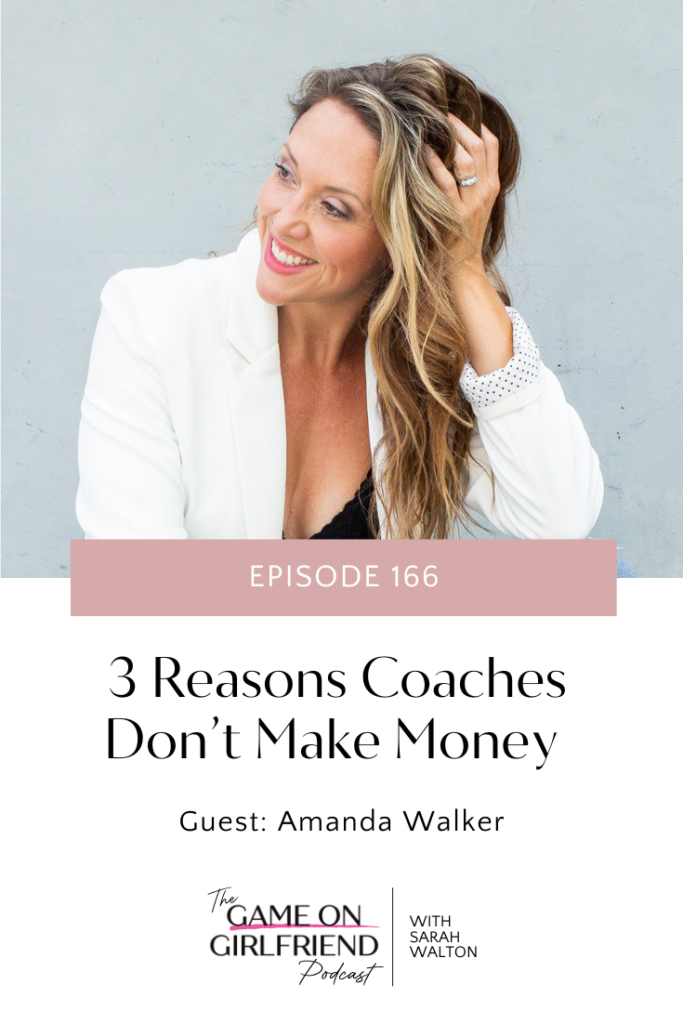Episode 166: 3 Reasons Coaches Don’t Make Money with Amanda Walker

I’m a coach who always has a coach. Amanda Walker is a Certified Master Coach who brings a common sense approach to inspire others. Whether you are a coach or not, today’s episode has something for everyone, especially if you've been feeling stuck or you're feeling like you're living with a whole bunch of unmet expectations.
We’ll also talk about why it’s so important that businesses that are run by coaches are actually seen as businesses – and dive into the reasons some coaches aren’t making more money. The online coaching industry is set to be worth $20 billion in 2023.
Why coaches aren’t making money
Amanda points to the mindset as one of the main reasons coaches aren’t making more money. The idea that coaches aren’t salespeople and other limiting beliefs around sales –that they are sleazy and gross – transfers over in a coach’s ability to sell. Coaches rooted in service tend to have a deep conflict around worthiness and their ability to receive money and be paid for that service. Understanding how to put a dollar amount on that service is a place where many amazing coaches get stuck.
Understanding the coaching profession
Amanda came from a no-business background. She didn’t have entrepreneur parents and didn’t grow up around sales. She entered the world of coaching as a blank canvas and her greatest lesson were taking action. “I think what really landed me full circle in coaching is the barrier of entry is minimal. Today I could decide I’m a coach and become a coach tomorrow because it’s loosely regulated. It’s really up to us, at the end of the day to build out our own personal integrity around how we deliver results,” says Amanda. Amanda works to help people overcome imposter syndrome and show them how to cultivate results. She says you can own changing people’s lives and simultaneously be working on growing credentials and upholding standards.
Breaking through the slimy sales process
Amanda suggests that anyone who’s feeling as though sales is slimy should write down all the thoughts they have about selling and sales in their business. The next step would be to look at that list and label each point as either a thought or a fact. A thought being something they routinely choose in their mind, versus a fact, which could be upheld in a court of law.
What she suspects is that a majority of the points on that list are just thoughts. If you think sales feels gross, that’s a thought that can be shifted; and the stories around sales that are holding you back can be broken down so you can move forward.
Squirrel effect and ‘Land of the Lost’
Amanda points to the positive correlation we expect when we start a business; put in a week’s worth of work and get a week’s worth of return. We set expectations that people will immediately take our offer. That’s not how it works though is it?
When there is a gap between our expectations – what we think the journey should look like and reality. The gap between those two places is what Amanda calls the Land of the Lost. People flounder when expectations don’t meet the reality of what’s happening. We tell ourselves it’s not working and then we quit.
This is where the squirrel effect comes in. We go back to the drawing board and look at what others are doing. So we’re in this chronic place of chasing the squirrel and starting over. We never really make any traction in our business because we’re not sticking to one strategy, and we’re not asking ourselves what IS working.
When you’re stuck in that moment, learning to develop grit is a way to make it through.
Watch: Motivation Is a Skill
Getting unstuck
When you’re in the moment thinking nothing is ever going to work, Amanda has two pieces of coaching that comes to mind. The first is a quote: “Your ability to delay gratification is directly correlated to your long-term success.”
The other challenge Amanda highlights are that most people have grown up relying on “away from” motivation, which means people are motivated to action when they’re in the pain of something, for entrepreneurs that might look like starting a business when they have no money in their bank account. It creates a rollercoaster on not only money but also clients because people don’t have a consistent attraction strategy to bring them in.
The opposite motivation is usually characterized by the ‘why’ or your purpose or fire inside of you. That motivation is going to be different for everyone. It might be to get out of debt or take care of aging parents. But the idea is when you start to tap into that why it sets you on a path toward action.
So as you move towards learning grit and persevering, Amanda recalls advice from a mentor: Do one thing a day. It will move the needle forward, be it an email, a pitch, or whatever needs to be done, because doing one thing every day will stack.
“We don’t give credit to the power of consistent action. Consistency trumps all things,” says Amanda.
Let’s get to it!




